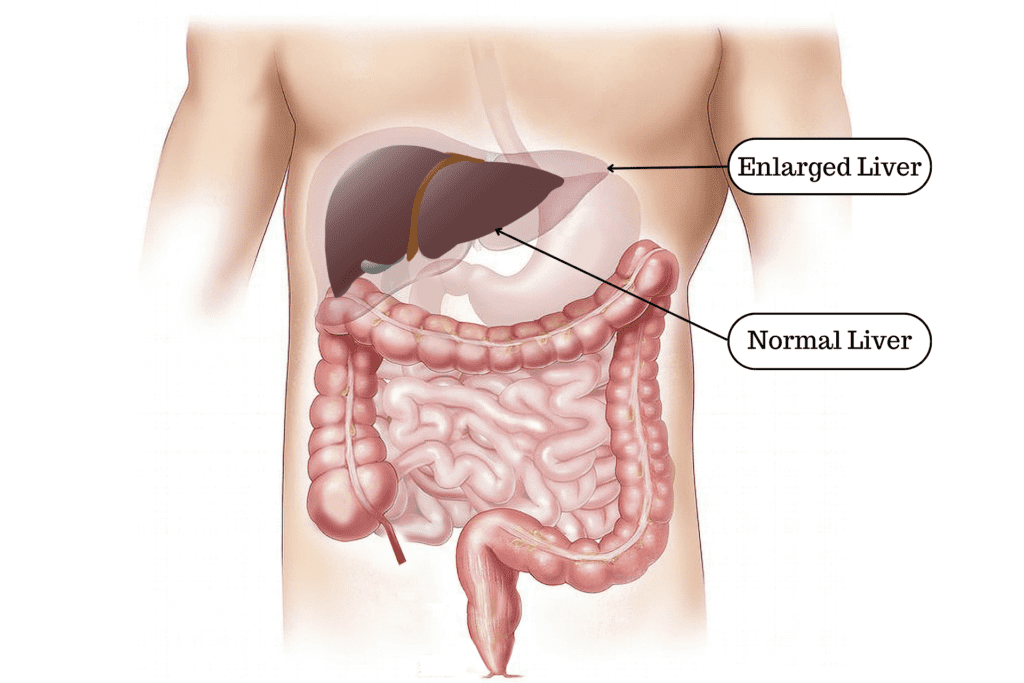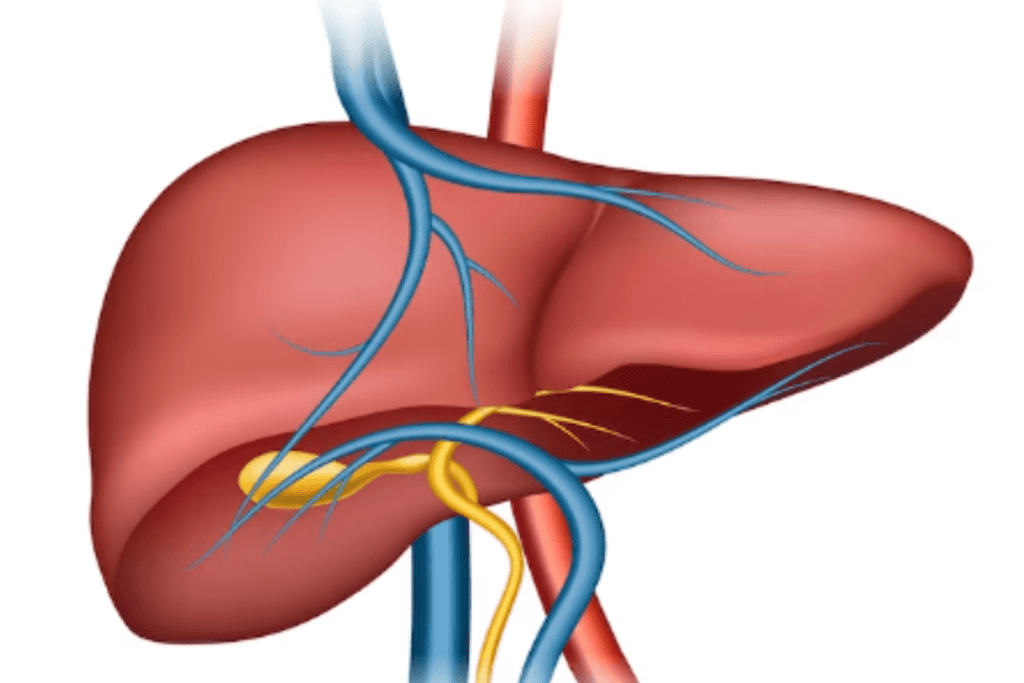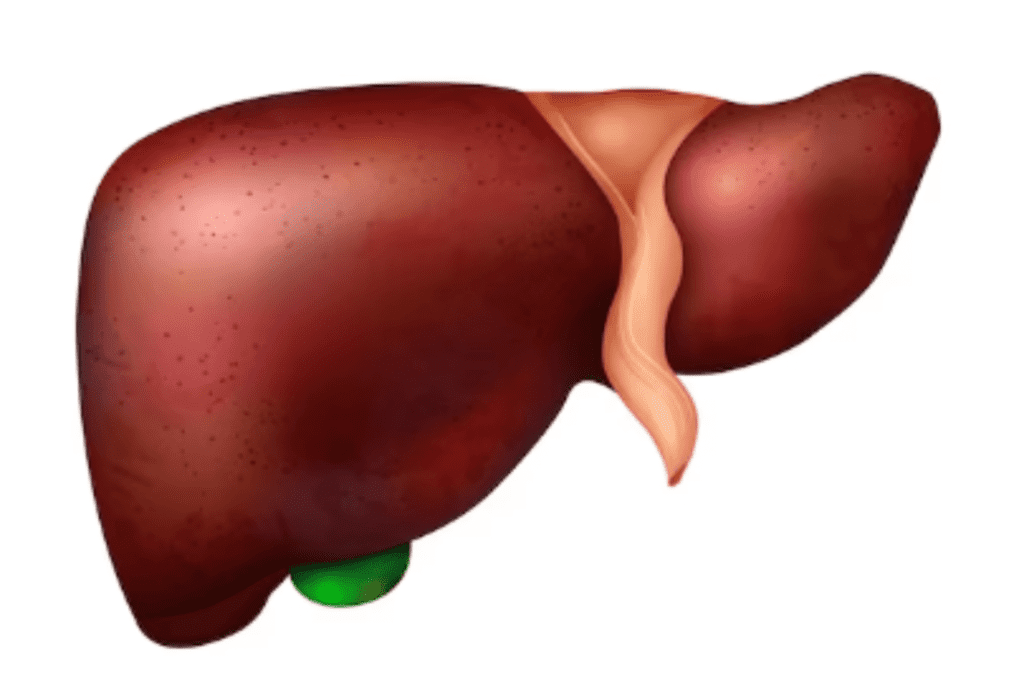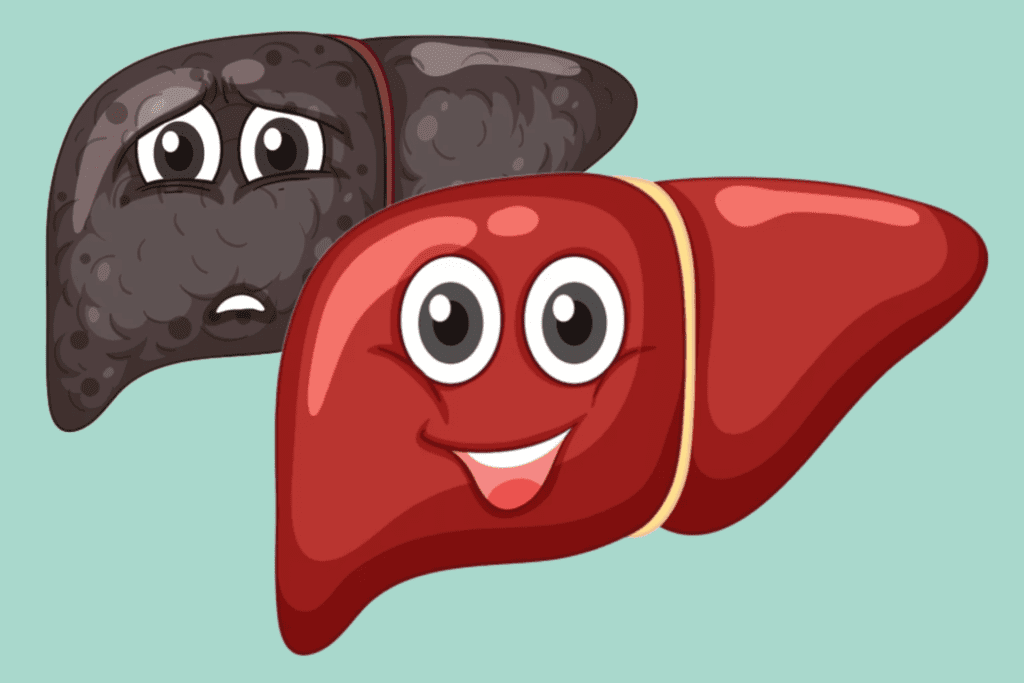We sometimes add products that we believe may be beneficial to our readers. We may receive a small commission if you purchase using the links on this page. Read our affiliate disclaimer
An enlarged liver, medically known as hepatomegaly, is a condition where the liver becomes larger than its normal size. The liver is a vital organ responsible for various functions, including processing nutrients, filtering toxins from the blood, and producing bile for digestion.
Table of Contents
ToggleHepatomegaly (Enlarged liver) is a symptom rather than a disease itself. It refers to the condition where the liver increases in size, often caused by various underlying medical conditions such as liver diseases, infections, or metabolic disorders. Identifying the cause of hepatomegaly is essential for appropriate diagnosis and treatment.
What Are the Causes of Enlarged liver?

An enlarged liver (Hepatomegaly), can be caused by various factors.
Some of the common causes include:
1. Liver Diseases
Hepatitis:
Hepatitis is inflammation of the liver, usually caused by viral infections (hepatitis A, B, C, D, or E) or autoimmune reactions. The liver becomes enlarged due to the immune response and cellular damage.
Cirrhosis:
This is a late stage of scarring (fibrosis) of the liver caused by many forms of liver diseases and conditions, such as hepatitis and chronic alcoholism. As scar tissue replaces healthy liver tissue, the liver enlarges.
2. Alcohol Abuse
Chronic and excessive alcohol consumption over a prolonged period can lead to alcoholic liver disease. The liver metabolizes alcohol, and excessive intake causes damage to liver cells, leading to inflammation and enlargement of the liver.
3. Heart Failure
When the heart is unable to pump blood effectively, blood can back up into the liver, causing congestion. This condition is known as congestive hepatopathy and can lead to hepatomegaly.
4. Other Infections
Tuberculosis:
In rare cases, tuberculosis can affect the liver and lead to hepatomegaly.
Liver Abscesses:
Liver abscesses, caused by bacteria or other microorganisms, can lead to inflammation and enlargement of the liver.
5. Metabolic Disorders
Hemochromatosis:
This is a genetic disorder that causes the body to absorb and store too much iron, leading to iron buildup in the liver and other organs, causing hepatomegaly.
Wilson's Disease:
Wilson’s disease is an uncommon genetic disorder that results in the buildup of copper in the liver and various organs, ultimately leading to hepatomegaly or an enlarged liver.
6. Certain Medications and Toxins
Some medications and toxins, such as certain prescription drugs, herbal supplements, or exposure to industrial chemicals, can cause liver damage and enlargement.
7. Nonalcoholic Fatty Liver Disease (NAFLD)
NAFLD is associated with lifestyle factors like obesity, diabetes, and metabolic syndrome. The accumulation of fat in the liver can cause hepatomegaly.
8. Liver Tumors
Both benign and malignant tumors can develop in the liver, leading to hepatomegaly. Liver cancer, such as hepatocellular carcinoma, can cause significant liver enlargement.
9. Autoimmune Disorders
Autoimmune Hepatitis:
This is a medical condition characterized by the immune system’s erroneous targeting of liver cells, leading to inflammation and enlargement of the liver.
10. Vascular Disorders
Certain vascular conditions affecting blood flow to the liver, such as Budd-Chiari syndrome or portal vein thrombosis, can lead to hepatomegaly due to congestion.
What are the Symptoms of Enlarged Liver?
The symptoms associated with hepatomegaly, or an enlarged liver, can vary depending on the underlying cause and the degree of liver enlargement. Often, an enlarged liver may remain asymptomatic, particularly during the initial stages. However, when symptoms do manifest, they can include:
Abdominal Discomfort

Image Designed by Freepik
A frequent symptom is pain or discomfort experienced in the upper right side of the abdomen. This sensation can be described as either a dull ache or a feeling of fullness.
Fatigue and Weakness
Liver enlargement can impact the liver’s ability to function properly, leading to fatigue, weakness, and a lack of energy.
Unexplained Weight Loss
An enlarged liver can sometimes affect the body’s metabolism, leading to unintended weight loss.
Jaundice
In certain cases, an enlarged liver may cause jaundice, a condition characterized by yellowing of the skin and eyes. Jaundice occurs when the liver is unable to properly process bilirubin, a waste product produced during the breakdown of red blood cells.
Nausea and Vomiting
Liver enlargement can lead to digestive disturbances, including nausea and vomiting.
Swelling
As the liver enlarges, it may cause swelling in the abdomen (ascites) and legs due to increased pressure in the blood vessels.
Spider Angiomas
These are small, spider-like blood vessels that can appear on the skin due to increased pressure in the liver’s blood vessels.
Bruising and Bleeding
A compromised liver may lead to reduced production of clotting factors, resulting in easy bruising and prolonged bleeding.
Changes in Urine and Stool
Liver dysfunction can cause changes in urine color (dark urine) and stool color (pale or clay-colored stool).
Loss of Appetite
Some individuals with hepatomegaly may experience a loss of appetite.
How to Diagnose Hepatomegaly
Diagnosing an enlarged liver (hepatomegaly) requires a comprehensive assessment conducted by a healthcare professional. The process may encompass the following steps:
Medical History
The healthcare provider will begin by taking a detailed medical history, including any symptoms you are experiencing, previous medical conditions, family history, and any medications or substances you may be taking.
Physical Examination
The doctor will perform a physical examination, which may involve palpating (feeling) the abdomen to assess the size and tenderness of the liver.
Blood Tests
Blood tests are commonly used to assess liver function and determine if there are any abnormalities. These tests may include liver enzyme tests (ALT, AST, ALP), bilirubin levels, albumin levels, and complete blood count (CBC).
Imaging Studies
Ultrasound:
An ultrasound of the abdomen is a non-invasive imaging technique that can provide detailed images of the liver’s size, shape, and internal structures.
CT Scan or MRI:
These imaging studies can provide more detailed and cross-sectional images of the liver and surrounding organs, helping to identify any abnormalities.
FibroScan or Elastography:
These specialized imaging techniques can assess the liver’s stiffness, which may indicate the presence of liver fibrosis or cirrhosis.
Liver Biopsy
In some cases, a liver biopsy may be necessary to obtain a small sample of liver tissue for microscopic examination. This procedure is usually performed under local anesthesia, and the tissue sample is analyzed to determine the cause and severity of liver disease.
Additional Tests
Depending on the suspected cause of hepatomegaly, additional tests may be ordered. For instance, if a viral infection is suspected, specific viral serology tests may be performed.
Evaluation of Underlying Conditions
Sometimes, hepatomegaly may be a manifestation of an underlying condition like heart failure, autoimmune disease, or certain metabolic disorders. The doctor may perform tests to evaluate and manage these conditions appropriately.
What is the Treatment for Enlarged liver?
The treatment for an enlarged liver (hepatomegaly) depends on identifying and addressing the underlying cause. It’s important to note that hepatomegaly itself is not a disease but a symptom of an underlying condition. Therefore, treating the specific cause is crucial for managing the enlarged liver.
Here are some common treatment approaches:
Lifestyle Changes
For cases related to nonalcoholic fatty liver disease (NAFLD) or alcoholic liver disease, lifestyle modifications are essential. This includes adopting a healthy diet, regular exercise, and weight management.
If alcohol abuse is the cause, quitting alcohol consumption is necessary to prevent further liver damage.
Medications
If hepatomegaly is due to liver infections, such as viral hepatitis, antiviral medications may be prescribed to manage the infection and reduce liver inflammation.
In certain autoimmune liver diseases, medications that suppress the immune system may be used to control inflammation.
Management of Underlying Conditions
If heart failure is causing liver enlargement, treating the heart condition and managing fluid retention can alleviate hepatomegaly.
Metabolic disorders, such as hemochromatosis or Wilson’s disease, require specific treatments to address the underlying disorder and prevent further liver damage.
Surgical Intervention
In some cases, liver surgery may be necessary to remove tumors or cysts causing hepatomegaly.
Liver Transplant
In severe cases of irreversible liver damage, liver transplant surgery may be considered as a last resort.
How to Prevent Hepatomegaly
Preventing an enlarged liver (hepatomegaly) involves adopting a healthy lifestyle and addressing potential risk factors.
Here are some key preventive measures:
Limit Alcohol Consumption
If you consume alcohol, do so in moderation. Chronic and excessive alcohol consumption can lead to alcoholic liver disease, which can cause liver enlargement and other liver-related complications.
Maintain a Healthy Diet
Adopt a well-balanced and nutritious diet that includes a diverse array of fruits, vegetables, whole grains, lean proteins, and healthy fats. Reduce the consumption of processed foods, sugary beverages, and saturated fats to promote optimal health.
Manage Weight
Strive to achieve and maintain a healthy weight by engaging in regular exercise and adhering to a balanced diet. Obesity and excessive weight gain can be contributing factors to nonalcoholic fatty liver disease (NAFLD) and the enlargement of the liver.
Exercise Regularly
Engage in regular physical activity to promote overall health and reduce the risk of obesity, diabetes, and metabolic syndrome, which can lead to NAFLD.
Avoid Hepatotoxic Substances
Be cautious with medications, herbal supplements, and other substances that can be harmful to the liver. Always follow prescribed dosages and consult a healthcare professional if you have concerns about the impact on your liver.
Practice Safe Sex
Hepatitis B and C can be transmitted sexually. Using barrier methods, such as condoms, can reduce the risk of contracting these infections.
Get Vaccinated
Maintain up-to-date vaccinations, particularly for hepatitis A and B. These vaccinations play a crucial role in preventing viral hepatitis and lowering the risk of liver damage.
Avoid Sharing Needles
Avoid sharing needles or any personal items that may come into contact with infected blood, as this can transmit viral hepatitis.
Manage Chronic Conditions
If you have diabetes, high blood pressure, or other chronic conditions, work with your healthcare provider to manage them effectively. Proper management can help reduce the risk of liver complications.
Regular Health Check-ups
Schedule regular check-ups with your healthcare provider to monitor your overall health and liver function. Early detection and timely treatment of any liver-related issues can help prevent liver enlargement.
FAQ
Q1: What is an enlarged liver?
A: An enlarged liver, also known as hepatomegaly, is a condition where the liver becomes larger than its normal size due to various underlying factors.
Q2: What causes an enlarged liver?
A: The causes of an enlarged liver can include liver diseases (hepatitis, cirrhosis), alcohol abuse, heart failure, infections (hepatitis viruses), metabolic disorders (hemochromatosis), fatty liver disease, and liver tumors.
Q3: What are the symptoms of an enlarged liver?
A: Symptoms may include abdominal pain, discomfort, fatigue, jaundice (yellowing of the skin and eyes), unexplained weight loss, nausea, and swelling in the abdomen or legs.
Q4: How is an enlarged liver diagnosed?
A: Diagnosis involves a medical history review, physical examination, blood tests (liver function tests), imaging studies (ultrasound, CT scan), and sometimes a liver biopsy.
Q5: Can an enlarged liver be reversed?
A: Whether an enlarged liver can be reversed depends on its underlying cause. Treating the cause promptly can lead to improvements in liver size and function.
Q6: Can lifestyle changes help with an enlarged liver?
A: Yes, lifestyle changes such as adopting a healthy diet, regular exercise, and limiting alcohol consumption can benefit certain causes of an enlarged liver, such as nonalcoholic fatty liver disease.
Q7: Is an enlarged liver always a sign of a serious condition?
A: An enlarged liver can be a symptom of various conditions, some of which may be serious. Prompt medical evaluation is essential to determine the cause and appropriate treatment.
Q8: How is an enlarged liver treated?
A: Treatment depends on identifying the underlying cause. It may involve lifestyle changes, medications, managing underlying conditions, surgical intervention, or liver transplant in severe cases.
Q9: Can an enlarged liver lead to liver failure?
A: In some cases, if the underlying cause is not treated, an enlarged liver can progress to liver failure. Timely detection and effective management are vital in preventing complications.
Q10: When should I seek medical attention for an enlarged liver?
A: If you experience persistent or concerning symptoms like abdominal pain, jaundice, or unexplained weight loss, it is important to seek medical evaluation for proper diagnosis and care.
Conclusion
In conclusion, an enlarged liver, known as hepatomegaly, can be caused by various factors such as liver diseases, alcohol abuse, infections, and metabolic disorders. Identifying the underlying cause is essential for appropriate treatment. Lifestyle changes, including a healthy diet and exercise, play a crucial role in preventing liver enlargement, especially in cases of nonalcoholic fatty liver disease (NAFLD). Regular health check-ups, vaccination against hepatitis, and avoiding hepatotoxic substances can further contribute to liver health. Early detection, timely intervention, and proper management of liver-related conditions are vital in safeguarding overall well-being and preventing the progression of liver diseases.
References
https://www.mayoclinic.org/diseases-conditions/enlarged-liver/symptoms-causes/syc-20372167
https://www.ncbi.nlm.nih.gov/pmc/articles/PMC2600125/
https://www.ncbi.nlm.nih.gov/pmc/articles/PMC3319283/
https://www.webmd.com/hepatitis/enlarged-liver-causes
https://www.cdc.gov/hepatitis/abc/index.htm
https://www.cdc.gov/ncbddd/jaundice/facts.html
https://www.ncbi.nlm.nih.gov/books/NBK470290/
https://www.ncbi.nlm.nih.gov/books/NBK507818/





